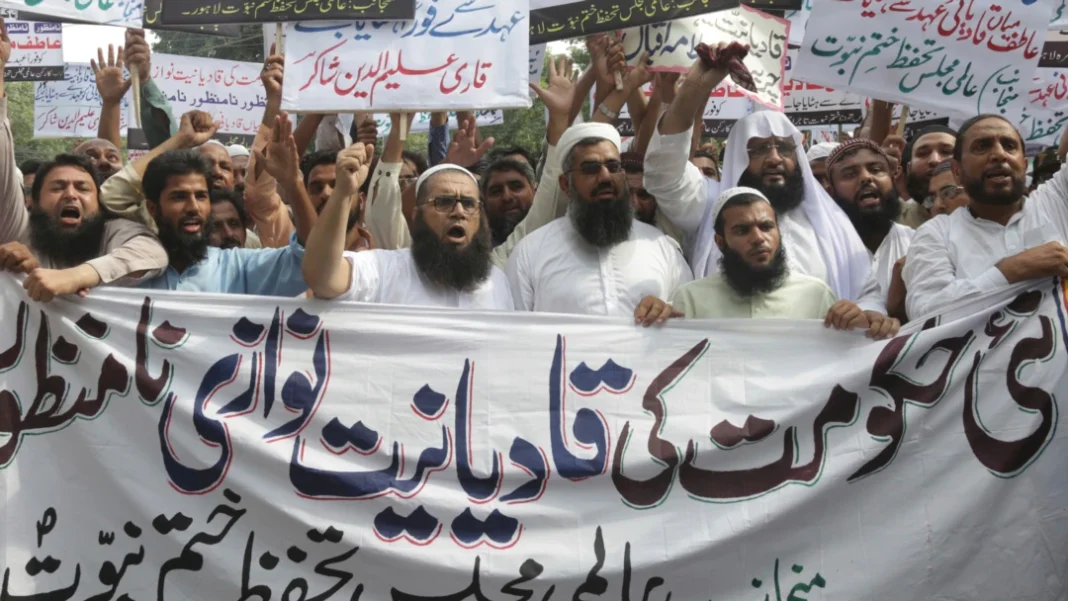Pakistan’s Ahmadi community is routinely subjected to discrimination which often enjoys legal and state sanctions resulting in the rise of extremism against them in the country.
Citing media reports, Asian Lite International said that unidentified suspects have desecrated Ahmadi graves in Pakistan Punjab.
The suspects desecrated four grave headstones and inscribed anti-Ahmadi slurs on them, Friday Times reported.
The incident occurred in Premkot, Hafizabad, on November 22, but came to light after, according to the Jamaat-e-Ahmadiyya.
Jamaat-e-Ahmadiyya spokesperson Aamir Mehmood said the incident took place at the same graveyard where Punjab Police had reportedly desecrated 45 graves of community members earlier in February.
Mehmood said the “heart-wrenching” incident was representative of rising intolerance in Pakistan. “Forget living Ahmadis, even our dead are not spared,” he said, Friday Times reported.
An Ahmadi man was booked by Karachi police under the nation’s Ahmadiyya-specific penal provisions for using Syed’ as a prefix earlier in the same month. The suspect, a lawyer, had been representing other Ahmadis before a court.
The man had submitted some documents in connection with the case. The documents, it has been claimed, featured Islamic terms. His name featured alongside, reported The Asian Lite International.
A school in Punjab’s Attock district expelled four Ahmadi students over their confession earlier in September. A relative of the students said they had been expelled for simply being Ahmadi.
He said a class fellow of one of the students had been harassing one of the students for some time. The students were expelled after some parents prevailed over school principal Kulsoom Awan, Friday Times reported.
The Ahmadi community in Pakistan lives as second-class citizens, their right to propagate and practice their religion is legally denied in Pakistan.
Most in the community are resigned to this fate but unfortunately even peaceful existence seems a distant dream when legal forums and mobs of attackers alike are mobilized to target the community and threaten their lives and livelihoods, reported Al Arabiya Post.
Moreover, Section 298-C of the Pakistan Penal Code elevates the discrimination against Ahmadiyyas into law. It prohibits Qadianis (Ahmadiyyas) from calling themselves Muslim or propagating their faith.
The section prohibits Ahmadiyyas from representing themselves as Muslims directly or indirectly, inviting others to practice or accept their religion and concludes with a deliberately overbroad clause that prohibits them from any action that “in any other manner whatsoever outrages the religious feelings of Muslims”.
This particular section, 298-C is commonly cited when blasphemy cases are filed against Ahmadiyyas, which is an increasingly common occurrence. This trend creates extreme risks for members of the Ahmadi community as the charge carries the death penalty.
The prosecution of these cases is often accompanied by overt intimidation. In reality, the law itself tends to outlaw the Ahmadi faith and renders their existence conditional on the sufferance of the least tolerant Muslims, reported Al Arabiya Post.
The framing of existing legislation allows any Muslim to generate a complaint if they feel that their religious feelings have been outraged by Ahmadis. This is an entirely subjective standard that is not very well suited to criminal law and encourages those who desire to target the community or abuse the legal system to settle personal scores.

